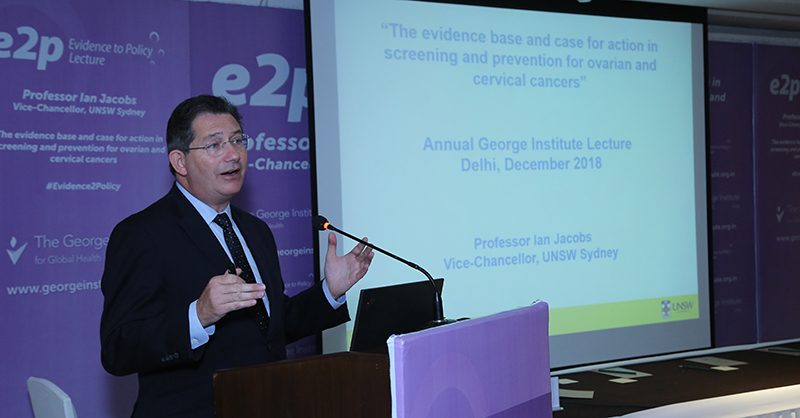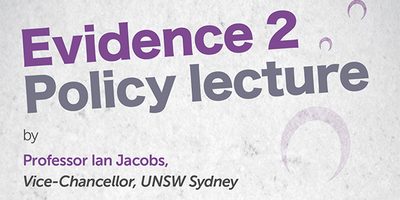
India urged to bridge the gap between evidence and policy in tackling women’s cancers
Underscoring the urgent need for countries like India to put women’s cancers on the map of the public health agenda, the Vice-Chancellor of UNSW Sydney, Prof Ian Jacobs today said India can benefit immensely from the global experience on screening and prevention in the area of ovarian and cervical cancers.
“The story of cervical cancer screening has been extraordinary. Intensified screening in developed countries has considerably reduced the risk of women dying from cervical cancer. The situation in less developed countries where women are dying each year because of cervical cancer is scandalous,” he said. In India, 350,000 women die due to cervical cancer and this is largely preventable, he said.
Delivering The George Institute India’s inaugural evidence2policy lecture on 'The evidence base and case for action in screening and prevention for ovarian and cervical cancers', Prof, Jacobs said the UNSW was keen to work with the George Institute and other partners in India on this issue. UNSW is one of the world’s top 50 universities and has set up an Institute for Global Development to drive collaborations and partnerships in a lot of areas including public health and in women’s health and cancer research.
Setting the context for the evidence2policy lecture and the focus on women’s cancers, Prof Vivekanand Jha, Executive Director of the George Institute for Global Health, India, a public health research institute that is at the forefront of NCD and health systems research, said appropriate response to women’s cancers should be made an integral part of the health policy if India is to achieve universal health coverage as envisaged under the Sustainable Development Goals.
Australian High Commissioner to India, Harinder Sidhu, who was the Chief Guest for the occasion, said cervical cancer was an issue close to her heart. It is preventable cancer, she pointed out, but there was a lot of misinformation in the area of HPV vaccination. She said the Australian High Commission in India launched a social media campaign to clear the misinformation. Talking about the Australia-India health partnership, she said health has been identified as one of the areas of co-operation in the new economic health strategy.
With more than 30 years’ experience in the field of ovarian cancer screening research and having established a large community-based cervical cancer screening program in Uganda, Prof Jacob’s lecture focussed on the gap between evidence and global action in cancer screening and what countries like India can learn from this global experience in terms of prioritising screening and prevention.
Prof Jacobs traced the history of the cervical cancer screening program tracing from the first pap smear tests which revealed that cervical cancer develops over a long period of time thus giving a lot of time for early screening programs to detect cancer. When the HPV was discovered, it made prevention possible through the HPV vaccination. So, both prevention, as well as screening, are quite possible.
Referring to a series of studies done in the US and the UK, screening for ovarian cancers among women in the high-risk group was a definitive strategy to prevent it along with removing the ovaries.
On the occasion, George Institute India honoured Prof Jacobs with a citation that recognised Prof. Jacobs’s immense contribution to the field of women’s health and the impact his research in the field of ovarian and cervical cancers has had on public health.
The lecture was followed by a panel discussion on women’s cancers: a public health agenda which was chaired by Dr Preetha Rajaraman, Regional Representative, South Asia, US Embassy, New Delhi. In her remarks, Dr Rajaraman said that there was an equity issue in the area of women’s cancers with most women dying in low and middle-income countries. The good news, she said, was that these cancers are very much preventable. Australia has been a model in the elimination of cervical cancers, she said.
The panellists included Jagdish Kaur, Regional Advisor, TFI, WHO SEARO; Sanjay Gupta, Scientist, National Institute of Cancer Prevention and Research; Neerja Bhatla, Professor, Department of Obstetrics and Gynaecology, All India Institute of Medical Sciences ; Krithiga Shridhar, Research Scientist, Public Health Foundation of India ; Jyotsna Govil, Vice Chairman, Indian Cancer Society and Roopa Hariprasad, Scientist, National Institute of Cancer Prevention and Research.
Speaking on the occasion, Dr Sanjay Gupta of NICPR spoke about the efforts underway for incorporating the screening of oral, breast and cervical cancer as part of the Comprehensive Primary Health Care rollout. He said there is a need for an integrated cancer care approach that includes education, awareness, screening, detection, treatment, and survivorship. Dr. Roopa Hariprasad from NICPR shared the training and capacity building of health workers in cancer screening.
Pointing out that tobacco was a great risk factor for women’s cancers, Dr Jagdish Kaur spoke about the tobacco-free initiative which she was heading at WHO-SEARO.
Dr Neerja Bhatla from AIIMS spoke about the screening modalities and linkages between screening initiatives and treatment options. She talked about the national program of screening for oral, breast and cervical cancers which has been rolled out. Screening for cervical cancer was based on visual inspection and not on HPV, the cost of which is very prohibitive. There is a discussion on producing low-cost indigenous HPV tests, she said.
Dr Kritiga Shridhar from PHFI shared her research around cancer burden, biology, management and survival in women. Diseases like cancer, she said, behave differently among men and women. Women, she said are affected by cancers in a different way and hence the treatment has to be different.
Dr Jyotsna Govil of the Indian Cancer Society spoke about the various initiatives they had launched for creating awareness on the most common cancers among women.
Globally, cancer incidence is 25% higher in men than in women. However, in India, more women are diagnosed with cancer than men. There are several possible explanations - one is lack of awareness and access to timely treatment which is common to many women’s health issues and therefore need to be addressed as an immediate public health agenda in the broader context of women’s health.
About Prof Vivekanand Jha
Professor Vivekanand Jha is the Executive Director at The George Institute for Global Health, India, a James Martin Fellow at The George Institute for Global Health, University of Oxford, and the President-Elect of the International Society of Nephrology.
Professor Jha has wide-ranging research interests, including understanding the health and societal impact of kidney diseases around the world and development of affordable, scalable and sustainable primary and secondary prevention tools. He has worked with many organisations including with WHO to develop clinical practice guidelines and advocacy papers, has lectured extensively around the world, and is a prolific writer and editor.
About Prof Ian Jacobs
Professor Ian Jacobs has been President and Vice-Chancellor of UNSW Sydney since 2015 and Chair of the Group of 8 universities since February 2018. Prior to this he was based in the UK as Dean of Medicine at University College London from 2009-11 and Vice President of the University of Manchester from 2011-15.
In his role at UNSW, he has led the development and implementation of the “UNSW 2025 Strategy” focused on academic excellence, social engagement and global impact. This has involved an ambitious programme of initiatives in research quality, educational innovation, equity and diversity, thought leadership, knowledge transfer, global development, and operational effectiveness. In his role as Go8 Chair he has initiated an engagement strategy focused on explaining the importance of the role and contribution of the Go8 universities to Australian society.
He qualified in medicine at Cambridge University and the University of London before specialising in surgical treatment of women’s cancers. He has for the last 30 years led a research team working on early detection and risk prediction of cancer with a particular focus on screening for ovarian cancer, which has led to grant awards >£50m, over 400 publications and an H-Index of >70.
In 2005 he established the Uganda Women’s Health Initiative, which conducts a series of projects in Uganda including a cervical cancer screening programme. He has been President of the British Gynaecological Cancer Society and the European Society of Gynaecological Oncology. He is Emeritus Trustee of the Eve Appeal charity which he founded in 1985 and a non-Executive Director of Abcodia Ltd a medical diagnostics company he founded as a spin-out from his research in 2010.
Since joining UNSW he has held a number of additional roles in Australia including: Honorary Senior Principal Research Fellow of the Garvan Institute; Board member of Research Australia; Board member of the Business/Higher Education Round Table Board (BHERT); Board member of Ovarian Cancer Australia; Board member of The Conversation; Chair of the Sydney Partnership for Health Education, Research and Enterprise (SPHERE); and most recently Chair of the Group of Eight universities.
About UNSW, Sydney:
Located in Sydney, a safe and student-friendly city, UNSW is home to more than 52,000 students from nearly 130 countries. UNSW has been attracting a growing number of bright Indian students for Undergraduate and Post Graduate studies in Business, Commerce, IT, Engineering, Design & Architecture. To address the skills gap in the healthcare industry UNSW, Sydney has introduced a Masters in Public Health program for Indian students in collaboration with Apollo Hospitals' MedVarsity,
As one of the world's leading research and teaching universities, UNSW's cutting-edge research and innovation - facilitated by 3,000 faculty - is known for acceptance and successful commercialisation.
About The George Institute India:
The George Institute for Global Health was established in India in 2007 to generate high-quality evidence and improve the health of millions of Indians by reducing premature deaths and disability from non-communicable diseases like cardiovascular disease, diabetes, kidney disease, stroke, mental health, and injuries.
The George Institute India’s research uses innovative approaches to create system-wide change for people at the bottom of the pyramid, develop affordable and scalable solutions, and to empower people to improve their own health. The George Institute also conducts research and advocacy around areas traditionally neglected by the healthcare and policy community - the health of women and girls, adolescents and promoting healthy eating.
One of the top-ranked medical research institutes in the world for impact, TGI India partners with over 60 national and international institutions such as the Public Health Foundation of India, the Postgraduate Institute of Medical Education and Research, University of Hyderabad; and has affiliations with UNSW Sydney (The University of New South Wales), University of Oxford and Peking University.
With researchers in Delhi, Hyderabad and around India, TGI India is a terrific example of Australia and India working together to improve people's health.




